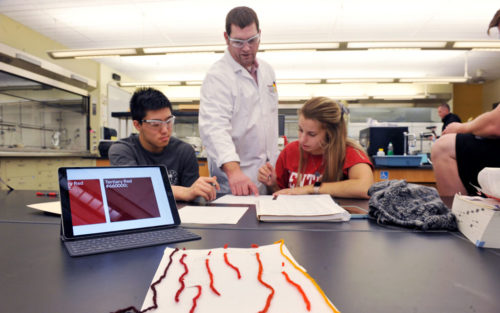Jay Wackerly, associate professor of chemistry at Central College, has been awarded the Organic Syntheses, Inc. Grant for Summer Research.
The grant includes $8,000 in funding for 10 weeks of summer research in 2021 and an additional $8,000 in summer 2022. Amy Philavanh, Class of 2022 and a biochemistry major from Ankeny, Iowa, will help Wackerly conduct research focused on the synthesis of a novel class of supramolecular macrocyclic host molecules termed “cambiarenes.”
From the Latin cambiare, meaning “to change,” these molecules can change from one form to another in the presence of a chemical or electronic stimulus. The first cambiarene was reported by the Wackerly lab last year in “Chemistry — A European Journal.” These newly invented cambiarenes may be able to act as molecular transport vehicles. Applications of such phenomena could range from targeted drug delivery to carbon sequestration.
This ongoing research has been funded through multiple grants, including the Moore Family Foundation Development Grant, since 2013.
“Having students for 10 weeks over the summer allows for extensive interaction between me and each student in an environment where they can apply their classroom and lab knowledge to solving new problems,” Wackerly says. “They are performing reactions and making discoveries that have not been previously known. I think it is this idea that motivates and interests the students in their research on an intrinsic level and will positively affect these students long term, especially as it relates to their career goals.”
Projects for summer research span the liberal arts, including the humanities, arts, natural sciences and social sciences. A 10-week summer experience at Central typically attracts 10-25 students, whose research ranges from studying the genetic barcoding of bees to the geographic distribution of Iowa’s bat populations.
“Grants like the one received by Dr. Wackerly allow students to engage in truly collaborative work with faculty in ways that they are not able to do during the hectic academic year,” says Brian Peterson, associate dean of curriculum and faculty development. “This work is highly experiential and highly beneficial. Under the mentorship of faculty, students learn more about what interests them and what they want to do as a vocation. Perhaps more importantly, summer collaborative research gives students and faculty the opportunity to explore a topic deeply, helping students understand education as curious inquiry.”
